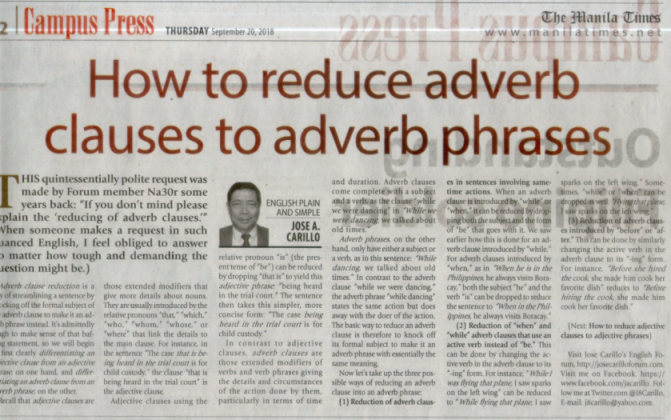This quintessentially polite request was made by Forum member Na30r some years back: “If you don’t mind please explain the ‘reducing of adverb clauses.’” (When someone makes a request in such nuanced English, I feel obliged to answer no matter how tough and demanding the question might be.)
Adverb clause reduction is a way of streamlining a sentence by knocking off the formal subject of the adverb clause to make it an adverb phrase instead. It’s admittedly tough to make sense of that baffling statement, so we will begin by first clearly
differentiating an adjective clause from an adjective phrase, on one hand, and
differentiating an adverb clause from an adverb phrase, on the other.
Recall that
adjective clauses are those extended modifiers that give more details about nouns. They are usually introduced by the relative pronouns “that,” “which,” “who,” “whom,” “whose,” or “where” that link the details to the main clause. For instance, in the sentence “The case
that is being heard in the trial court is for child custody,” the clause “that is being heard in the trial court” is the adjective clause.
Adjective clauses using the relative pronoun “is” (the present tense of “be”) can be reduced by dropping “that is” to yield this
adjective phrase: “being heard in the trial court.” The sentence then takes this simpler, more concise form: “The case
being heard in the trial court is for child custody.”
In contrast to adjective clauses,
adverb clauses are those extended modifiers of verbs and verb phrases giving the details and circumstances of the action done by them, particularly in terms of time and duration. Adverb clauses come complete with a subject and a verb, as the clause “while we were dancing” in “
While we were dancing, we talked about old times.”
Adverb phrases, on the other hand, only have either a subject or a verb, as in this sentence: “
While dancing, we talked about old times.” In contrast to the adverb clause “while we were dancing,” the adverb phrase “while dancing” states the same action but does away with the doer of the action. The basic way to reduce an adverb clause is therefore to knock off its formal subject to make it an adverb phrase with essentially the same meaning.
Now let’s take up the three possible ways of reducing an adverb clause into an adverb phrase:
(1) Reduction of adverb clauses in sentences involving same-time actions. When an adverb clause is introduced by “while” or “when,” it can be reduced by dropping both the subject and the form of “be” that goes with it. We saw earlier how this is done for an adverb clause introduced by “while.” For adverb clauses introduced by “when,” as in “
When he is in the Philippines, he always visits Boracay,” both the subject “he” and the verb “is” can be dropped to reduce the sentence to “
When in the Philippines, he always visits Boracay.”
(2) Reduction of “when” and “while” adverb clauses that use an active verb instead of “be.” This can be done by changing the active verb in the adverb clause to its “-ing” form. For instance, “
While I was flying that plane, I saw sparks on the left wing” can be reduced to “
While flying that plane, I saw sparks on the left wing.” Sometimes, “while” or “when” can be dropped as well: “
Flying that plane, I saw sparks on the left wing.”
(3) Reduction of adverb clauses introduced by “before” or “after.” This can be done by similarly changing the active verb in the adverb clause to its “-ing” form. For instance, “
Before she hired the cook, she made him cook her favorite dish” reduces to “
Before hiring the cook, she made him cook her favorite dish.”
This essay, 1110th of the series, appeared in the column “English Plain and Simple” by Jose A. Carillo in the Campus Press section of the September 20, 2018 issue (print edition only) of The Manila Times
, © 2018 by the Manila Times Publishing Corp. All rights reserved.
(Next:
How to reduce adjective clauses to adjective phrases) September 27, 2018